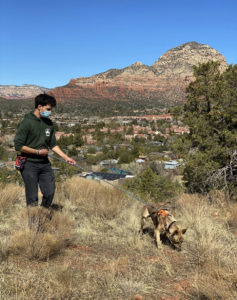Pandemic has caused challenges for pets and owners.
In some cases, it also has added new difficulties to the world of pet ownership.
Sudden changes for families facing unemployment and a loss of income because of the sweeping effects of COVID-19 have caused some to have to leave their homes because of evictions and foreclosures.
The unexpected and unwelcome chaos has left some pet owners to believe they have no other choice than to surrender their pets to animal shelters.
It is a heartbreaking way to have to part with one’s pets, said Jennifer Brehler, executive director of the Humane Society of Sedona (HSS). “Sadly, so far this year, 25% of the animals surrendered by their owners to HSS were the result of housing challenges.”
For the Humane Society of Sedona, the focus is on companion animals, dogs, puppies, cats, kittens and other small household companions such as rabbits, guinea pigs and hamsters.
“Our shelter is in a unique position that most of our animals come from other communities by way of being transported from other animal shelters, as we have a very low stray population in our immediate area of Sedona,” said Brehler, who began her career in animal sheltering and welfare 24 years ago at the Michigan Humane Society.
However, transporting animals of all kinds became more complicated and worrisome when the pandemic was unfolding.
“For the first few months of the pandemic, animal shelters across the country halted transporting animals to other communities, as there was so much unknown with how COVID may affect animals, as well as the risk to the people doing the transportation to other communities,” she recalled. “Once it was determined animals did not pose a significant risk and protective measures for people were put into place, we were able to begin transporting in animals to HSS.”
One bright spot during the pandemic is that pet adoption has become more popular, as people are spending so much time at home.
“Early on, we saw a significant increase in the number of people stepping up to foster and adopt shelter animals, with them having more time available and especially for individuals living alone as they were looking for companionship,” she said. “A large majority also came forward to help homeless animals in general and to open up space at shelters for other animals in need.”
There is some concern, however, that there will be a significant increase in the number of animals becoming homeless as the eviction moratorium is lifted across states, said Brehler, who lectures regularly at national animal welfare conferences and is an active member of The Association for Animal Welfare Advancement. “I’ve heard some shelters have experienced this already as tenants are choosing to move sooner rather than continue to collect charges that they will not be able to pay back as they have lost their jobs.”
Meanwhile, the Humane Society of Sedona has been operating on an appointment-only basis since the pandemic began. “It has significantly changed the level of guest services and increased the satisfaction and connection to our adopters and others we serve with our surrender, rehoming and lost and found programs. Visitors get a better experience, and the stress placed on staffing and animals has greatly decreased.”
Accommodations are still being made for walk-in traffic for various programs, including some adoptions.
For small animal and feline adoptions, adopters can visit in the animal rooms, but canine companion adoption meet-and-greet opportunities occur in the outdoor play yard and dog park.
“At times, people may be asked to come back a short time later for the next open appointment time,” she said. “We monitor traffic flow, require masks and maintain physical distancing throughout the facility.”
Many new procedures brought on during the pandemic may continue well beyond.
“At this time, we intend to continue with this model past the pandemic,” Brehler said. “It has allowed us to streamline our programs, given us the time to focus on community involvement to help keep people and pets together, and dedicate better, not just more, time to the animals in our care.”
Looking ahead, there will be additional challenges when pets have to adapt to a return to normal for their owners’ work and school responsibilities. Brehler says shelters, trainers and behaviorists are bracing for separation anxiety in animals, especially for dogs. “We have seen this happen in the past with a smaller percentage of dogs when families return to school and longer work days after summer vacation. Given the extended timeframe of the pandemic, there is reason to worry.”
For those interested in providing a home for an animal in need, there are four main animal shelters with adoption programming in the Verde Valley and Flagstaff areas:
Humane Society of Sedona, 2115 Shelby Drive, Sedona AZ, 86336. For more information, call 928-282-4679, email info@humanesocietyofsedona.org, or visit humanesocietyofsedona.org.
Verde Valley Humane Society, 1520 W Mingus Ave, Cottonwood, AZ 86326. For more information, call 928-634-7387, or visit verdevalleyhumanesociety.org.
High Country Humane, 11665 N. US-89, Flagstaff, AZ 86004. For more information, call 928-526-0742, or visit highcountryhumane.org.
Coconino Humane Association, 3501 E Butler Ave, Flagstaff, AZ 86004. For more information, call 928-526-1076, or visit coconinohumane.org. FBN
By Betsey Bruner, FBN








Leave a Reply